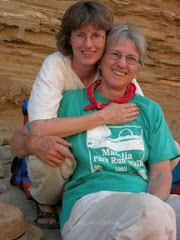Question: What is the difference between palliative care and hospice care?
Answer: Palliative care offers pain and symptom management for people at any time during an illness. Hospice care seeks to ease pain and suffering for terminally ill patients.
This easy-to-understand explanation comes from the new book From the Start Consider the Finish: A Guide to Excellent End-of-Life Care (Outskirts Press, 2007). It’s a collection of true stories and practical advice written by attorney Susan R. Dolan and her clinical psychologist mother, Audrey R. Vizzard. Both authors are also nurses and hospice volunteers.
In 17 short chapters, they cover everything from Managing Pain and Funeral Plans to What It’s Like To Die. One of my favorite chapters, the Pleasure Diet, advises that terminal patients be allowed to eat whatever they want. That’s how one man who had stopped eating got his final wish: a tall, cold beer. “Ten minutes later that man died with a smile on his face” (84).
I found myself filled with admiration for Susan Dolan’s extraordinary mentor, Divina, a smart, tough, funny, and compassionate hospice nurse. I also admire Mollie, the social worker who threw herself over the body of a dead hospice patient to prevent paramedics from performing CPR until the DNR--Do Not Resuscitate--order was found under the kitchen table. (Becky and I recently learned that in some medical facilities, the term “DNR” is being replaced by “AND” -- Allow a Natural Death.)
“Doctors Are Human Too” was one of the saddest chapters for me. A usually decisive doctor agonized at her father’s hospital bedside over whether to remove his ventilator. When the author suggested hospice care, Dr. Lucie said that would feel as if she had failed. But she started to question all the times she had withheld hospice referrals from her patients, recommending instead one more aggressive treatment. Susan Dolan notes that many doctors “overestimate the length of time their patients have to live, thereby depriving them of the benefits of hospice” (79).
Dr. Lucie’s father had neglected to complete an advanced directive or have a conversation about how he wanted to be treated if he was unable to make decisions for himself. Most people avoid talking about their own death or making any plans for it. The authors reiterate the importance not only of written documents but of ongoing conversations with loved ones about our final wishes. Even one family member left out of this conversation could prevent removing life-support machines and allowing a natural death.
This book is a many-faceted gem, and I highly recommend it. For families who are considering hospice, this book will show them what to expect. The explanation of what each member of a hospice team does, including volunteers, physicians, chaplains, music therapists, and grief counselors, is invaluable.
Susan Dolan has an internet radio program called Reach MD aimed at medical professionals. She produced two fabulous 15-minute interviews with my brother Bill Manahan. M.D. about Living Consciously, Dying Gracefully: A Journey with Cancer and Beyond. You’ll be able to download these interviews from the http://www.nanbec.com/ media page soon.
Nancy
Tuesday, December 4, 2007
From the Start Consider the Finish
Subscribe to:
Post Comments (Atom)


No comments:
Post a Comment